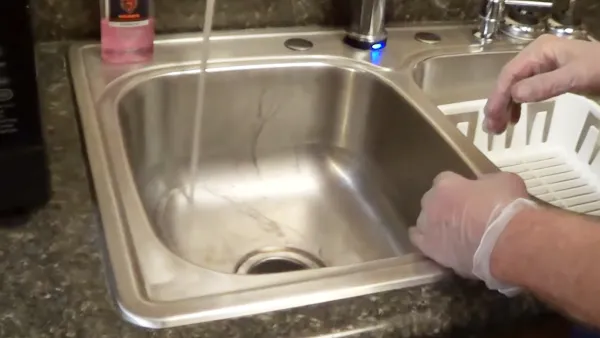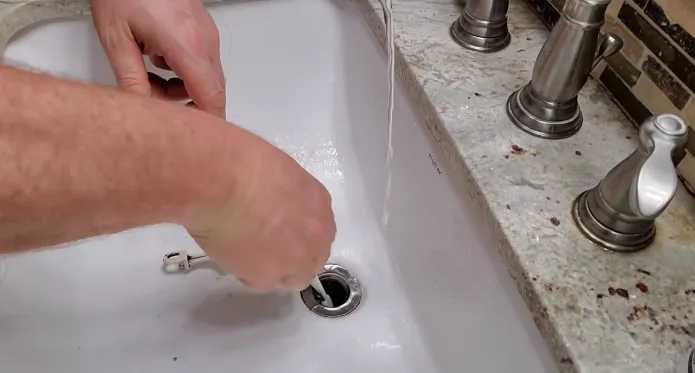Last Updated on November 14, 2023
A clogged kitchen sink is a household problem that can make it difficult for you to do your cooking chores. If you’ve noticed water backing up in your kitchen sink, you may be dealing with a clog caused by grease and oil. But with a few simple steps, you can get your sink draining freely again.
Pouring a pot of boiling water directly down the clogged sink can help loosen the grease and fat. Pour about 1/2 cup of baking soda with 1/2 cup of vinegar as the chemical reaction breaks down the fats and oils. Afterward, pour a second round of hot water to wash away any remaining residue.
In today’s discussion, we’ll discuss using common household items to unclog oil in the kitchen sink. With these steps, you can avoid using expensive and potentially hazardous chemical drain cleaners. So keep reading.
How to Unclog Oil in Sink: Steps You Can Follow

If you find your kitchen sink clogged with oil and grease, there are steps you can follow to unclog it.
- Wear protective gloves
- Pour boiling water into the drain
- Add baking soda and vinegar
- Plunge the drain
- Repeat the process of pouring boiling water
- Check for drainage
STEP 1. Wear Protective Gloves
Put on your protective gloves to protect your hands from contamination or scalding from hot water while unclogging the kitchen sink. The gloves will create a barrier between your skin and the hot water, preventing direct contact.
STEP 2. Pour Boiling Water in the Drain
Now, carefully pour a pot of boiling water down the drain to help loosen the oil clog in your sink. The hot water will melt the oil, grease, and fat that have built up and caused the blockage.
Be sure to pour the water slowly and steadily to avoid splashing or potential burns. The boiling water should be able to reach the clog and begin to loosen it.
STEP 3. Add Baking Soda and Vinegar
Mix the baking soda and vinegar, causing a chemical reaction that helps break down the fats and oils clogging your kitchen sink. You’ll notice fizzing and bubbling when you pour this mixture into the drain. Don’t be alarmed; this indicates the chemical reaction is working.
Combining baking soda and vinegar creates a powerful cleaning agent that can dissolve your pipes’ stubborn grease and grime. Allow the mixture to stand for at least 15 minutes or until the fizzing stops.
STEP 4. Plunge the Drain
Now, give the plunger a few forceful pumps to create a strong seal around the sink’s drain and dislodge the clog. The force exerted by the plunger can push the clog further down the pipe or break it apart, allowing the water to flow freely again.
Cover the kitchen drain opening with the plunger and apply firm pressure when plunging. Use quick, vigorous motions to create suction and force the clog to loosen. Repeat this process several times, if necessary, until the water starts draining properly.
STEP 5. Repeat the Process of Pouring Boiling Water
You should carefully pour another pot of boiling water through the drain to help remove any remaining oil residue. Repeating this process ensures that any leftover oil residue is thoroughly washed away.
STEP 6. Check for Drainage
Inspect your kitchen sink’s drainage to ensure the oil clog has been successfully cleared. When checking for drainage, turn on the faucet and let the water run for a few minutes.
Observe if the water is draining freely or if it’s still slow. The oil clog may not have been fully cleared if the water is still draining slowly. In such cases, you may need to repeat the unclogging process or consider using a commercial drain cleaner as a last option.
What happens if I accidentally put oil down the kitchen sink drain?
If you accidentally drain oil in the kitchen sink drain, it can cause clogs and potentially lead to expensive plumbing repairs in the long run.
When oil is poured down the drain, it can coat the inside of the pipes and solidify over time, creating a blockage. This blockage can prevent water from flowing freely and can cause backups and overflows.
Also, oil can attract other debris, such as food particles and hair, further contributing to the clog. To avoid these issues, properly dispose of grease by letting it cool and solidify in a container, then throwing it in the trash.
How long does it take for grease and oil to clog a drain?

Pouring grease and oil down the kitchen drain can quickly clog it as the sticky substances solidify and obstruct the water flow. Even if you pour it as a boiling hot liquid, it only takes a few minutes to solidify and become a sticky glob.
Once solidified, it can cling to the sides of the pipes and accumulate over time, causing a complete blockage. This can lead to slow draining, unpleasant odors, and potentially damage your plumbing system.
Can a small amount of oil go down the drain?
Even a small amount of oil can cause clogs if it goes down the kitchen drain. It may seem harmless to pour a little oil down the sink, but over time, it can accumulate and cause serious blockages in your sewer lines.
That’s why dispose of oil properly. Instead of pouring it down the drain, pour it into a container and throw it in the bin. Alternatively, you can use it as a tasty treat for your dog.
What can dissolve oil in a drain?
You can try a few effective solutions for unclogging oil in a kitchen sink.
One option is to use white cleaning vinegar and hot water. Simply combine equal vinegar and hot water, then pour it down the drain. The vinegar helps to break down the fats and oils from the kitchen drain, allowing it to flow more easily.
Another option is to use dish soap and hot water. The soap acts as a surfactant, helping to dissolve the oil and grease. Mix a generous amount of dish soap with hot water and pour it down the drain. Let it sit for a while, then flush it with hot water.
Follow the Proper Steps to Unclog a Clogged Sink Caused by Oil
A clogged kitchen sink due to oil and grease can inconvenience your daily routine. With our step-by-step guide, you can effectively unclog your sink without calling for professional help.
Always wear protective gloves when cleaning out your sink, and use common household items like boiling water, baking soda, and vinegar to break down the oil and grease.
If these methods don’t work, consider calling a local plumber for further assistance. Following these simple instructions, you can get your kitchen sink constantly draining without issues.

